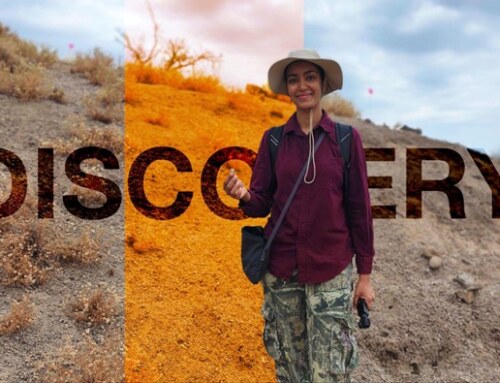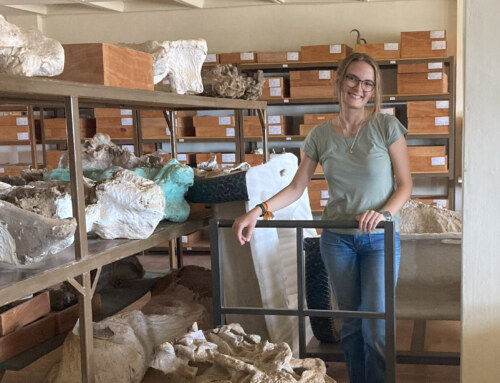
Katie Swartvagher (right) receiving her B.A in Anthropology at Stony Brook University
When Katie Swartvagher graduated early this in May 2025, with a BA in Anthropology from Stony Brook University, she carried more than a degree. She carried the imprint of a landscape thousands of miles away, Turkana, Kenya and a field school experience that transformed her understanding of science, community, and herself.
Katie comes from Wappingers Falls, New York, and her academic path has been anything but traditional. Before settling on her major, she was a full-time aerial skier training professionally, juggling competition with online courses from her local community college. Over the years, she transferred between institutions, explored three majors, and even came close to completing a degree in Psychology before a single Anthropology seminar at SUNY Buffalo changed everything. That spark grew into something deeper at Stony Brook, where faculty mentors like Dr. Lisa Hildebrand and Dr. Carrie Mongle encouraged her to apply for Stony Brook University’s TBI Origins Field School program. “They were the biggest motivators,” Katie says. “Both had taught me before, and both helped shape my time at TBI.”
In Turkana, Katie immersed herself in every moment from geochemical fieldwork at paleoanthropological sites to conversations under the stars. Her most memorable experience was her independent study during the Human Evolution module, where she worked closely with a team of geochemists in the field. But equally memorable were the quiet moments: “I was surprised by how loud silence can be,” she says. “Back home, I grew up with seven siblings. In Kenya, for the first time, I noticed the wings of birds, the chorus of frogs at night. Silence wasn’t empty, it was alive.”

Katie with fellow field school students in Turkana, learning in the field
Each day at TBI she followed a pattern. Waking with the sun, field lectures, lab sessions, tea breaks, and nightly journaling. With a gluten allergy, Katie had initial concerns about meals, but those were quickly managed thanks to Chef Alex in Ileret, who made sure every meal was safe and sustaining. “It meant everything to feel cared for in that way,” she says.
Katie also brought her whole self to the field. While studying in Kenya, she continued serving as Treasurer of the Vocalists at Stony Brook, managed online coursework, and stayed active in university clubs. Between fossil layers and sediment analysis, she also found time to discover a new passion, birding. With fellow cohort member Kevin and Dr. Greg Henkes during the Geology module, she identified nearly 50 bird species using the Merlin Bird ID app.

Left: Katie at the Turkel Campus. Right: Students celebrate the wrap up of their field school in Turkwel
But perhaps the biggest transformation came from how others saw her. “Other students started coming to me for help with concepts, with assignments. I realized I was respected by my peers and faculty, and that planted a seed. Maybe I belong in higher education. Maybe I can do this.” That seed has grown into a clear goal, to pursue graduate studies and a career in academia. But for now, Katie is taking a thoughtful gap year to explore more fieldwork and gain clarity before the next step. “Grad school is a big decision. I want my next chapter to be informed by real world experience.”
Would she return to Turkana? “In a heartbeat,” she says. “My time at TBI was one of the most valuable experiences of my undergraduate career.”
To students considering the field school, her advice is clear: “Go for it. It’s worth every second and every penny. And bring boots with good tread, a half size up!”
As she reflects on the journey, Katie’s gratitude is palpable. “To the faculty, staff, teaching assistants, students and everyone behind the scenes who made TBI run, thank you. Your work doesn’t go unnoticed. You gave me an experience I’ll carry for life.”
Authors: Laura Katana and Katie Swartvagher.





